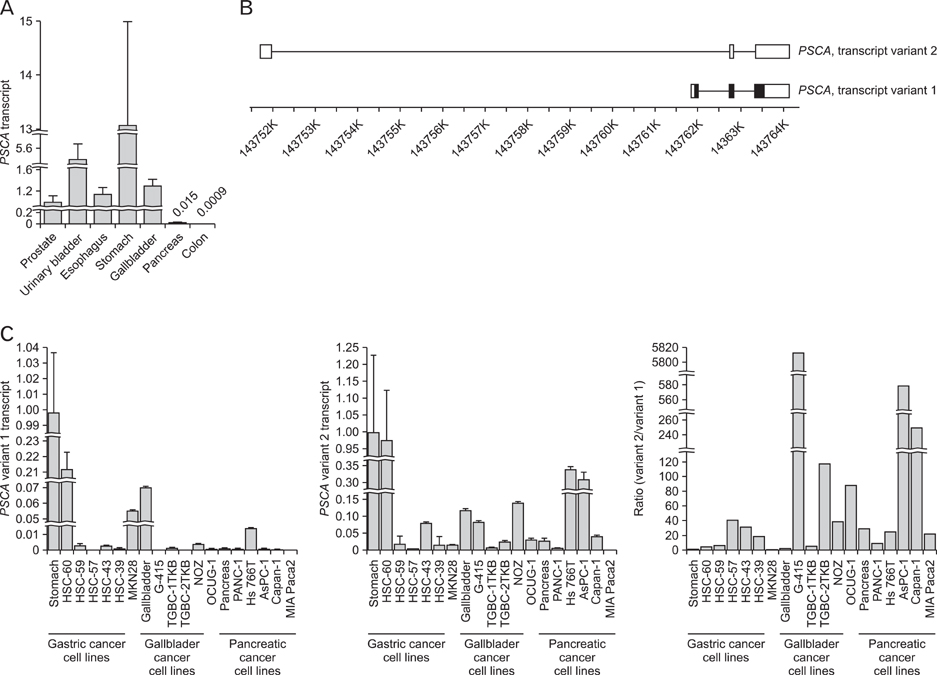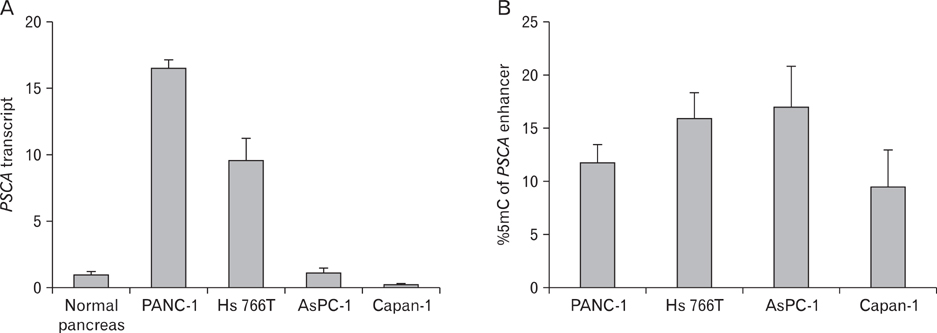Anat Cell Biol.
2012 Sep;45(3):149-154. 10.5115/acb.2012.45.3.149.
Prostate stem cell antigen gene is expressed in islets of pancreas
- Affiliations
-
- 1Division of Genetics, National Cancer Center Research Institute, Tokyo, Japan. nsaeki@ncc.go.jp
- KMID: 2046741
- DOI: http://doi.org/10.5115/acb.2012.45.3.149
Abstract
- Prostate stem cell antigen (PSCA) is a glycosylphosphatidylinositol-anchored cell surface antigen with an organ-dependent expression pattern in cancers; e.g., up-regulated in prostate cancer and down-regulated in gastric cancer. Previously it was reported that PSCA is not expressed in the normal pancreas but aberrantly expressed in pancreatic cancer. In this present study, we identified PSCA expression in islets of the pancreas by immunohistochemistry, which was co-localized with four islet-cell markers: insulin, glucagon, somatostatin and pancreatic polypeptide. In our investigation of the transcription start site of PSCA, we found a non-coding splicing variant of PSCA as well as authentic PSCA transcripts in mRNA samples from a normal pancreas. Both the transcripts were also identified in several pancreatic cancer cell lines. We previously reported that PSCA expression is correlated to the methylation status of the enhancer region in gastric and gallbladder cancer cell lines but not in pancreatic cancer cell lines, suggesting that PSCA expression is regulated in a diff erent mode in pancreatic cancer from that in gastric and gallbladder cancers.
Keyword
MeSH Terms
-
Antigens, Surface
Cell Line
Gallbladder Neoplasms
Glucagon
Immunohistochemistry
Insulin
Islets of Langerhans
Methylation
Pancreas
Pancreatic Neoplasms
Pancreatic Polypeptide
Prostate
Prostatic Neoplasms
RNA, Messenger
Somatostatin
Stem Cells
Stomach Neoplasms
Transcription Initiation Site
Antigens, Surface
Glucagon
Insulin
Pancreatic Polypeptide
RNA, Messenger
Somatostatin
Figure
Reference
-
1. Saeki N, Gu J, Yoshida T, Wu X. Prostate stem cell antigen: a Jekyll and Hyde molecule? Clin Cancer Res. 2010. 16:3533–3538.2. Sharom FJ, Radeva G. GPI-anchored protein cleavage in the regulation of transmembrane signals. Subcell Biochem. 2004. 37:285–315.3. Reiter RE, Gu Z, Watabe T, Thomas G, Szigeti K, Davis E, Wahl M, Nisitani S, Yamashiro J, Le Beau MM, Loda M, Witte ON. Prostate stem cell antigen: a cell surface marker overexpressed in prostate cancer. Proc Natl Acad Sci U S A. 1998. 95:1735–1740.4. Study Group of Millennium Genome Project for Cancer. Sakamoto H, Yoshimura K, Saeki N, Katai H, Shimoda T, Matsuno Y, Saito D, Sugimura H, Tanioka F, Kato S, Matsukura N, Matsuda N, Nakamura T, Hyodo I, Nishina T, Yasui W, Hirose H, Hayashi M, Toshiro E, Ohnami S, Sekine A, Sato Y, Totsuka H, Ando M, Takemura R, Takahashi Y, Ohdaira M, Aoki K, Honmyo I, Chiku S, Aoyagi K, Sasaki H, Yanagihara K, Yoon KA, Kook MC, Lee YS, Park SR, Kim CG, Choi IJ, Yoshida T, Nakamura Y, Hirohashi S. Genetic variation in PSCA is associated with susceptibility to diffuse-type gastric cancer. Nat Genet. 2008. 40:730–740.5. Ono H, Hiraoka N, Lee YS, Woo SM, Lee WJ, Choi IJ, Saito A, Yanagihara K, Kanai Y, Ohnami S, Chiwaki F, Sasaki H, Sakamoto H, Yoshida T, Saeki N. Prostate stem cell antigen, a presumable organ-dependent tumor suppressor gene, is down-regulated in gallbladder carcinogenesis. Genes Chromosomes Cancer. 2012. 51:30–41.6. Argani P, Rosty C, Reiter RE, Wilentz RE, Murugesan SR, Leach SD, Ryu B, Skinner HG, Goggins M, Jaffee EM, Yeo CJ, Cameron JL, Kern SE, Hruban RH. Discovery of new markers of cancer through serial analysis of gene expression: prostate stem cell antigen is overexpressed in pancreatic adenocarcinoma. Cancer Res. 2001. 61:4320–4324.7. Kawaguchi T, Sho M, Tojo T, Yamato I, Nomi T, Hotta K, Hamada K, Suzaki Y, Sugiura S, Kushibe K, Nakajima Y, Taniguchi S. Clinical significance of prostate stem cell antigen expression in non-small cell lung cancer. Jpn J Clin Oncol. 2010. 40:319–326.8. Geiger KD, Hendruschk S, Rieber EP, Morgenroth A, Weigle B, Juratli T, Senner V, Schackert G, Temme A. The prostate stem cell antigen represents a novel glioma-associated antigen. Oncol Rep. 2011. 26:13–21.9. Tran CP, Lin C, Yamashiro J, Reiter RE. Prostate stem cell antigen is a marker of late intermediate prostate epithelial cells. Mol Cancer Res. 2002. 1:113–121.10. Smukler SR, Arntfield ME, Razavi R, Bikopoulos G, Karpowicz P, Seaberg R, Dai F, Lee S, Ahrens R, Fraser PE, Wheeler MB, van der. The adult mouse and human pancreas contain rare multipotent stem cells that express insulin. Cell Stem Cell. 2011. 8:281–293.11. Desgraz R, Herrera PL. Pancreatic neurogenin 3-expressing cells are unipotent islet precursors. Development. 2009. 136:3567–3574.12. Grubbs EG, Abdel-Wahab Z, Tyler DS, Pruitt SK. Utilizing quantitative polymerase chain reaction to evaluate prostate stem cell antigen as a tumor marker in pancreatic cancer. Ann Surg Oncol. 2006. 13:1645–1654.13. McCarthy DM, Maitra A, Argani P, Rader AE, Faigel DO, Van Heek NT, Hruban RH, Wilentz RE. Novel markers of pancreatic adenocarcinoma in fine-needle aspiration: mesothelin and prostate stem cell antigen labeling increases accuracy in cytologically borderline cases. Appl Immunohistochem Mol Morphol. 2003. 11:238–243.14. Tanaka M, Komatsu N, Terakawa N, Yanagimoto Y, Oka M, Sasada T, Mine T, Gouhara S, Shichijo S, Okuda S, Itoh K. Increased levels of IgG antibodies against peptides of the prostate stem cell antigen in the plasma of pancreatic cancer patients. Oncol Rep. 2007. 18:161–166.15. Wente MN, Jain A, Kono E, Berberat PO, Giese T, Reber HA, Friess H, Büchler MW, Reiter RE, Hines OJ. Prostate stem cell antigen is a putative target for immunotherapy in pancreatic cancer. Pancreas. 2005. 31:119–125.16. Morris MJ, Eisenberger MA, Pili R, Denmeade SR, Rathkopf D, Slovin SF, Farrelly J, Chudow JJ, Vincent M, Scher HI, Carducci MA. A phase I/IIA study of AGS-PSCA for castration-resistant prostate cancer. Ann Oncol. 2012. 05. 02. [Epub]. http://dx.doi.org/10.1093/annonc/mds078.
- Full Text Links
- Actions
-
Cited
- CITED
-
- Close
- Share
- Similar articles
-
- Study for the Improvement of Early Implantation and Long Term Graft Survival in Pancreatic Islet Cell Transplantation by Induction of Angiogenesis with Gene Transfection of Vascuar Endothelial Growth Factor
- Pancreas Islet Cell Transplantation
- Pancreas Islet Cell Transplantation: Present and Future
- Immunohistochemical Study of Solid-Pseudopapillary Tumor of the Pancreas
- Immunohistochemical localization of eight phospholipase C isozymes in pancreatic islets of the mouse




